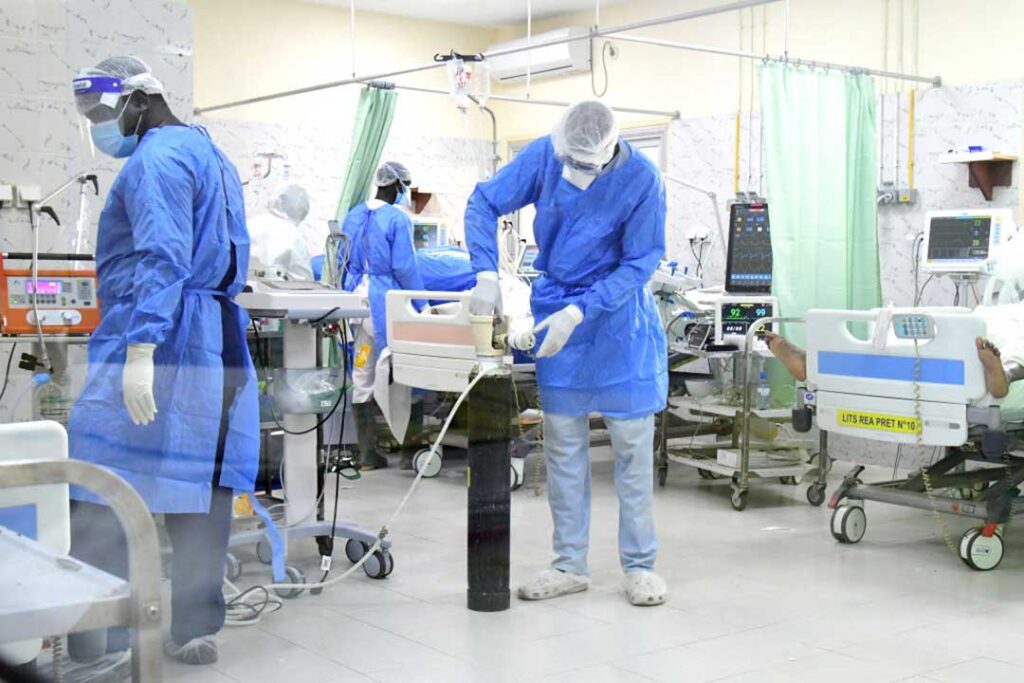ADF STAFF
The U.S. government delivered medical oxygen supplies to four regional referral hospitals in Tanzania on February 18, further supporting the nation’s battle against COVID-19.
The supplies included oxygen cylinders, handheld gas monitors, pulse oximeters, glucometers, gauges and flowmeters with humidifiers, and oxygen cylinder carts, all of which are used to treat severely ill COVID-19 patients. Officials distributed the supplies to hospitals in Dodoma, Tanga, Mwanza and Arusha.
“The COVID-19 pandemic is among the most pressing challenges to the health, well-being, and economic security of all people,” Ananthy Thambinayagam, health director of the United States Agency for International Development (USAID), said at a handover ceremony. “We must work together to address this pandemic with urgency.”
In November 2021, the U.S. donated $550,000 to Tanzania to buy oxygen cylinders, patient monitors and oxygen concentrators. Workers distributed the equipment to 12 hospitals in Arusha, Bukoba, Dar es Salaam, Iringa, Kagera, Kigoma, Kilimanjaro, Mbeya, Morogoro, Mtwara, Ruvuma and Singida.
Two months earlier, the U.S. helped Tanzania launch a $750,000, 10-month project to improve health care for critically ill COVID-19 patients at four regional referral hospitals. The funds are to buy oxygen therapy equipment and provide training for health care workers in its use and maintenance.
In February 2021, COVID-19 cases were so high that seven hospitals in Tanzania’s commercial hub of Dar es Salaam ran out of beds and had to turn patients away. Oxygen and respirators were in short supply, and intensive care units were full, Bloomberg reported.
In response, Tanzania installed medical oxygen production plants at seven of its largest referral hospitals. The plants can fill 200 oxygen cylinders a day.
Tanzania’s efforts to halt the spread of COVID-19 changed after the March 2021 death of President John Magufuli, who dismissed the pandemic as little more than a Western hoax.
New President Samia Suluhu Hassan established prevention measures and — with U.S. assistance — started theStrengthening COVID-19 Case Management in Regional Referral Hospitals to improve health care for critically ill COVID-19 patients at four hospitals.
Under Hassan, Tanzania in October 2021 completed its first intra-action review of the country’s response to the COVID-19 pandemic, per International Health Regulations recommendations.
Tanzania became one of the first African countries to complete its second such review in February 2022, according to ReliefWeb.
“Although Tanzania had initial setbacks at the beginning of her response to COVID-19 pandemic, WHO will continue to provide needed technical leadership of the overall response to ensure that Tanzanians in Mainland and Zanzibar are largely protected from COVID-19 infections,” Dr. William Mwengee of the World Health Organization told ReliefWeb.
On February 16, Zanzibar, a semiautonomous group of 50 islands that has been unified with Tanzania since 1964, started using exponential deep examination scanners to detect COVID-19 in travelers at Abeid Amani Karume International Airport.
The scanners can detect a possible COVID-19 infection by measuring electromagnetic waves, which change when particles of the virus are in a person’s body. The scanners, developed by the Abu Dhabi Research Institute and health management company Sanimed, offer immediate results.
“When it comes to conducting Covid tests, there have always been a lot of problems, and you know all these tests were really invasive, but this is the first non-invasive test but also the first test of its kind in Africa,” Zanzibari President Hussein Mwinyi said in a report by Africanews. “So for us, it’s a huge success for Zanzibar.”

